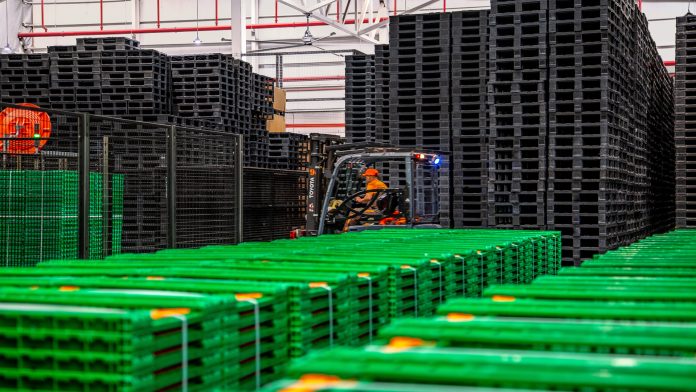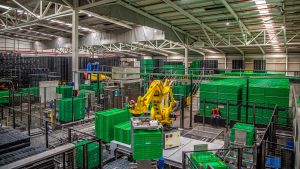The Innovation Platform speaks to Nuria Ballester, Strategy and Innovation Director at Logifruit, about their role in packaging and transporting food for the green economy.
From the moment we begin to consider what delicious dish we can surprise our own with, we are choosing which ingredients will help us in that ideal preparation, and so we are also deciding what impact our purchase choice will have on the environment.
Today, many people choose to buy their food in a store, since it is rare to have a farm or orchard to obtain food directly from nature. To select a product, they look at the aspect, the nutritional information, the expiration date, and, increasingly, the origin. The consumer wants to be informed; they want to know what processes have been used in the preparation and distribution of these foodstuffs. Where was it grown? Who caught it? These are questions that the consumer wants to see answered. In short, they want to know how this product has arrived in perfect condition on the supermarket shelf and consequently in their shopping basket.
The food industry, aware that the production and consumption of its products have environmental implications, is actively working to continuously improve the environmental performance of its products, as well as the processes associated with them. These foods go through different points along the supply chain to reach the consumer’s pantry in a perfect state.
Logifruit
Logifruit is a Spanish company that has been working for almost 25 years to ensure that the products acquired by consumers in the supermarket have arrived there in perfect condition, with quality and food safety being the main priorities.
The company’s reusable plastic transport containers are used throughout the supply chain and help to make all the logistics processes surrounding these foods increasingly sustainable. Thus, it fulfils its purpose of connecting supply networks sustainably. In fact, its foundation involved the reinvention of the supply chain, with the creation of a pioneering logistics system based on standardisation and reuse – a model that has made it a national benchmark in the rental of reusable plastic containers.
Logifruit’s mission is to satisfy the packaging and transportation needs of its customers’ supply network, proposing, developing, co-innovating, and co-creating value-added solutions and guaranteeing the highest quality of service.
Thanks to its experience and knowledge of the sector, it has earned the trust of the leading Spanish and international companies in the food sector. These businesses use Logifruit to find the packaging necessary for their products to arrive at our homes in perfect condition and which generate the least possible environmental impact.
The use of quality plastic packaging is a clear trend in the food industry since it can be reused and, at the same time, meet the food industry’s strict quality standards, where safety is key. To provide this service to its more than 1,000 clients, Logifruit is present in nine countries in Europe and Africa, and it has developed a total of 14 logistics platforms strategically distributed in the Iberian Peninsula.
Continuous life cycle
As a logistics service provider, Logifruit offers a horizontal service to the supply chain, providing real added value with proximity, agility, personalised attention, and flexibility in an environment that is continually changing and evolving. Its packaging is integrated into the day-to-day business, and after each use, goes through an exhaustive sanitation process that allows them to be reused and reincorporated into the chain process, creating a continuous life cycle.
The mission of its packaging is to facilitate the storage, transportation, and linear disposition of consumer goods. Ecodesign in packaging ideation is key to reducing the use of raw materials, enabling reuse of the container, repairing the container to extend its useful life, and recycling it to manufacture new containers when a repair is not possible. According to the Unesco Chair in Life Cycle and Climate Change, Logifruit’s plastic boxes impact 25% less on the environment than cardboard boxes on national transport.
A green and circular economy
Logifruit is a clear example of a green and circular economy that, as an advocate of Green Logistics, is continuously transforming its structure and processes to support a sustainable model through the efficient and responsible use of resources. The company has opted for reducing the environmental impact and increasing the protection of the environment by optimising the consumption of water, energy, cleaning products, and raw materials. Its measures include the reduction and reuse of water in the container sanitisation process, the introduction of state-of-the-art machinery such as break detectors or more powerful centrifuges, or, as already explained, the recycling of the entire container at the end of its useful life for the creation of new containers.
Throughout the history of Logifruit, there has been a constant desire for improvement and innovation to respond to the needs of the food sector, always looking for solutions that allow their products to reach our homes safely and which minimise the impact on Nature.
Thanks to the circular economy model, in 2019 Logifruit managed to save the environment 352 tonnes of recycled plastic and 865 tonnes of CO2, creating an inspirational model for sustainable management, satisfying the logistics needs of its clients, co-innovating and collaborating with all its stakeholders, and contributing to social and global growth. In conclusion, Logifruit has developed a management model that generates sustainable and lasting growth over time for the agri-food industry.
Nuria Ballester
Strategy and innovation Director
Logifruit S.L
+34 963 803 179
nuria.ballester@logifruit.es
www.logifruit.es/en










